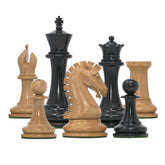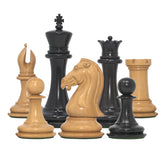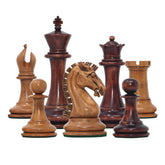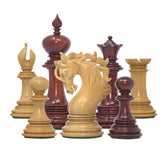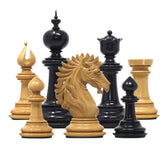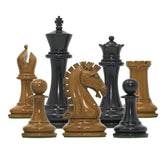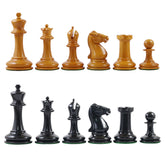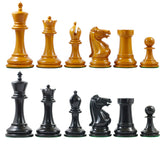HOW TO UNDERSTAND CHESS RATINGS
Chess rating is a numerical representation of a player's skill level in the game of chess. It serves as a benchmark to compare players and assess their relative strength. Chess ratings enable players to measure their progress, participate in tournaments, and compete against opponents of similar skill. The concept of chess rating was first introduced by Arpad Elo, a Hungarian-American physics professor and chess player, in the 1960s. Elo developed the Elo rating system, which has become the most widely used method for calculating chess ratings. The system takes into account the performance of players in their games, considering factors such as the rating of opponents and the outcomes of the games played.

Buy Wooden Chess Sets and Pieces — www.stauntoncastle.com
A chess rating is typically represented as a number, such as 1200, 1800, or 2200. The higher the rating, the stronger the player is considered to be. The scale is continuous, and each rating point represents a difference in expected outcome between two players. For example, if Player A has a rating of 1500 and Player B has a rating of 1600, Player B is expected to win more games against Player A.
The calculation of chess ratings is based on a mathematical formula derived from the Elo system. When two players with known ratings face each other, the result of the game is used to update their respective ratings. If a player performs better than expected (wins against a higher-rated opponent or achieves a draw against a stronger player), their rating will increase. Conversely, if a player performs worse than expected (loses against a lower-rated opponent or draws against a weaker player), their rating will decrease.
Chess ratings are dynamic and can change over time as players compete and accumulate more games. The more games a player plays, the more accurate their rating becomes, as it reflects a larger sample of their performance. However, it is important to note that ratings are not absolute measures of skill, but rather a relative indication of performance within a specific pool of players.
Different organizations and chess federations may use slightly different rating systems or variants of the Elo system. The most prominent and recognized rating system is maintained by FIDE (Fédération Internationale des Échecs), the international governing body for chess. FIDE ratings are used in official tournaments and competitions worldwide and are considered a standard measure of a player's strength.
Chess ratings have several practical applications. They are used to determine pairings in tournaments, ensuring that players of similar strength face each other. Ratings also play a role in establishing title norms and can be a factor in the selection of players for national teams or invitation-only events.
For chess enthusiasts, ratings provide a sense of progression and improvement. Players can set goals to reach a certain rating milestone, such as breaking the 2000 mark or achieving a master-level rating. Ratings also facilitate finding opponents for casual or online play, as players with similar ratings are likely to provide challenging and balanced games.
Chess ratings are numerical representations of a player's skill level in the game of chess. They allow players to gauge their progress, compete against opponents of similar strength, and participate in tournaments. The Elo rating system, devised by Arpad Elo, forms the basis for most chess rating calculations. Ratings are dynamic and can change over time as players compete and accumulate more games. Whether as a measure of personal growth or a tool for matchmaking and competition, chess ratings are an integral part of the chess world.
RATINGS DEFINED
Ratings, in a general sense, are numerical or qualitative assessments that indicate the level, quality, or performance of a particular entity or individual. Ratings serve as a way to categorize and compare various items, products, services, or people based on specific criteria or standards.
Ratings can be found in numerous domains and industries. For example, in the world of entertainment, movies and TV shows often receive ratings that provide an indication of their suitability for different audiences or their overall quality. These ratings can help viewers make informed decisions about what they might enjoy watching.
In the business realm, products and services are often reviewed and rated by consumers or experts. These ratings can influence purchasing decisions, as potential buyers consider the experiences and opinions of others to determine the value and reliability of a product or service.
In the field of education, students may receive ratings or grades to assess their academic performance and progress. These ratings help educators, students, and parents gauge the level of understanding and mastery of a particular subject or skill. Ratings can also be used to evaluate the performance or reputation of individuals in various professions. Athletes, for example, may be ranked or rated based on their skills, achievements, and records. Similarly, employees in organizations may receive performance ratings to assess their contributions and determine rewards or promotions.
In the digital age, online platforms and applications often employ rating systems to provide feedback and assess user experiences. This allows users to rate and review products, services, or experiences, providing valuable information to both providers and potential users.
WHAT IS DETERMINING RATINGS ?

Buy Wooden Chess Sets and Pieces — www.stauntoncastle.com
Determining ratings involves assessing and analyzing relevant data or criteria to assign a numerical or qualitative value that represents the level or quality of a particular entity. The specific method for determining ratings varies depending on the context. In some cases, expert opinions or evaluations are considered, while in others, data-driven algorithms or statistical models are used. Ratings may be based on factors such as performance, customer reviews, objective measurements, or comparisons to established benchmarks. The goal is to establish a fair and accurate representation of the entity's attributes or capabilities, providing users with valuable information for decision-making and comparison purposes.
NEED TO KNOW EARNING RATINGS
Earning ratings involves actively participating in activities or endeavors where assessments are made to determine one's level of skill, performance, or quality. To earn ratings, individuals typically need to demonstrate their abilities, achieve certain milestones, or meet specific criteria set by the rating system or governing body. This could involve participating in competitions, receiving evaluations from experts or peers, or accumulating a track record of accomplishments. Earning ratings provides recognition and validation of one's skills and achievements, and can open up opportunities for advancement, competitive play, or further growth in a particular field or domain.
